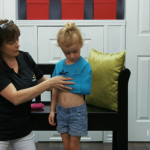

- 16 September 2023
- |
- Andrée Bouchard
Child sexual abuse… it’s a chilling thought. It’s a disturbing thought that leaves you feeling ashamed, powerless, sad, afraid and angry. Even in this age of communications, the problem of child sexual abuse is still difficult to tackle.
Although family aggressors (who live with the child) and familiar aggressors (who are part of the child’s entourage) are responsible for 80% of assaults committed against children, foreign aggressors remain the ones who scare us the most, because they take on the face of all the people we don’t know: the gentleman walking his dog, the motorist looking for directions, the teenager driving his remote-controlled car in the park…
You will find in our training document ” Detecting and preventing child sexual abuse “You’ll find tools to detect and report cases of sexual abuse, and even better, educational methods to help children protect themselves against possible aggression.
No child is completely safe from sexual predators. Yet many parents are afraid to frighten their children by telling them about the existence of people who might want to incite them to perform acts that violate intimacy, acts we call sexual assault. Educating children about such situations is essential for their safety. We need to approach the issue objectively, focusing on the essentials.
Here are a few concepts to put into practice:
- Educate the child about good and bad touches. For example, children need to learn to distinguish between a hug and an embrace under duress. This will help them distinguish between healthy sexual behavior and unacceptable behavior.
- Use the right terms when naming body parts. A child with no sexual vocabulary will find it difficult to describe the solicitation.
- Avoid describing abusers as sick, mean, ugly or dangerous. In the vast majority of cases (80%), the abuser is someone the child knows, likes and trusts. Children need to learn that anyone can “play the wrong game”.
- Don’t demand absolute obedience from your child. All parents want their children to be seen as well-behaved and obedient. But be careful not to confuse obedience with submission.
- Teach your child that he or she has the right to say “no”. Children should never be touched, cajoled or hugged if they don’t want to.
- Teach children the notion of privacy. Children need to know the importance of privacy and understand that their genitals belong to them alone.
- Explain to children that they must tell an adult if they have been solicited or touched by another adult.
What should you do if your child reports being approached by a stranger?
Even if the unknown assailant only plays a role in 20% of assaults, we must continue to tell children that they should never follow a stranger, male or female, accept gifts, get into a car or even stop to talk to a stranger.
If your child confides in you that he or she has been approached by a stranger, call 9-1-1.
Remember, you have to report a situation… it’s not your responsibility to identify an abuser, let alone prove their guilt.
For the number of the youth center to contact, see the list at :
www.msss.gouv.qc.ca/jeunes
In case of emergency, call 9-1-1




